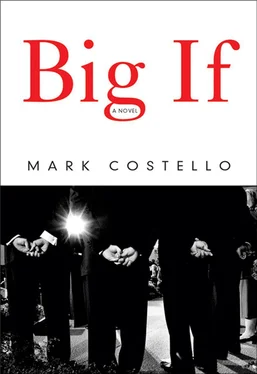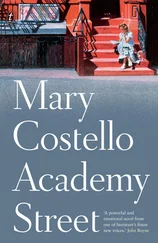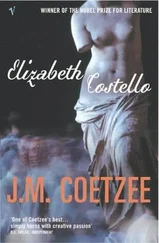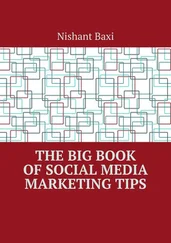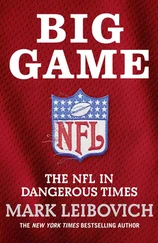“You leave me no choice then,” the Director said. “I’ll send you and your son back to L.A. if you don’t take the job.”
Gretchen learned that day just how cold it was on the white part of the mountain. She also learned that the Director was not a spineless moron as so many people thought. No, he was actually quite tough and crafty in his way, because he had somehow figured out the one thing in his power that she was afraid of: a transfer to Los Angeles. She was afraid of Los Angeles, specifically afraid, as children are afraid of basements. She was not afraid of San Diego, or anything north of maybe Oxnard or Bakersfield or something. She was a native Los Angeleno (Watts, to be exact), and growing up she had never been above Santa Monica, nor much south of Seal Beach (her mother had a nephew in the Navy there and they’d visited him once before he went to Vietnam). She had never seen the other side of the San Gabriels, the mountain bowl around her world — you couldn’t see the mountains through the smog, but everybody knew that the city was so smoggy because of the mountains, and so the smog was daily proof of what it obscured. She didn’t get around much as a kid and even now her grasp of geography was a little iffy. She wasn’t absolutely certain that she was not afraid of let’s say Chino or Simi or Snapple Valley — wasn’t that a town across the mountains or did she make it up? Going down to San Diego or up as far as Oxnard, she was doing fine, but in between, the smoggy nether, she was starting to get scared. Debbie Escobedo-Waas was a Californian too, but she was the other kind of Californian, the brainless, energetic kind, the kind who didn’t sense Armageddon on the way. This was probably because Debbie came from the Valley, another hazy concept, not the inner city, where the truth was like a bus line and it ran right past your house. Gretchen was old enough to remember the riots, the first riots of her life, 1965, which they always called the riots down in Watts, until they had another riot in the ’90s and had to start naming them for clarity’s sake. Debbie wasn’t even born in 1965, and even if she had been alive and thinking, how much could she have seen from San Fernandoland? Gretchen, at the epicenter, didn’t see that much in 1965. She was at her aunt’s house, three bedrooms and a patch of dust in back and a dog named Goblin on a chain. Gretchen always went to her aunt’s after school and in the summer to play with her cousins and the dog until her mother came back from work.
Gretchen’s mother, Mildred Williams, worked in the cafeteria at Paramount Pictures, mostly on the pie line, sometimes on the drink line. She was never on the carving board, a station of prestige reserved for a man of chefly gravitas, and she never filled a salad bar. By the time salad bars came into vogue, Mildred Williams was a lunch cashier and too senior for the salad bar. There was a separate canteen for the celebrities at Paramount. Gretchen’s mother fed the grips and secretaries, took their nickels, took their dimes, slapped a roll of quarters against the edge of the cash register drawer, and all the quarters spilled into the quarter section of the drawer. Mildred Williams was a stylish cashier, a saved, believing Christian, and a fixture at the cafeteria. She knew all of the celebrities, though she never fed them — Harry Belafonte, Lena Horne, even the Mills Brothers going back a ways. Mildred Williams, being the old-fashioned sort, only believed in black achievement, black success, black celebrities. To her, it was as if Henry Fonda had never happened, as if Marilyn Monroe had been a big celebrity to fish or to some other species on some distant planetoid, because the biggest star on earth was clearly Sidney Poitier, such a handsome man and so polite. Mildred Williams and her sisters and her cousins out of Houston were churchy women, all of them, and basically southern, and they got along, Gretchen thought, by ignoring everything they didn’t like, or didn’t get, or believed had not been made for them, and they didn’t covet it, or care, or really notice in their hearts, and this was the world that blew up in the riots.
Gretchen’s father, Joseph Williams, drove an airfreight truck out of LAX (some line you never heard of and the trucks were always breaking down). He had been over the mountains many times, down to Mexico on runs, up to Alaska with the Army. He knew many words in Eskimo, including “Aleut,” their word for Eskimo, which means “people,” because, he said, they lived up there in isolation thinking they were the only people in creation until 1941 or so. Her father did not believe in celebrities, black, white, or purple polka-dot, he always said, because the Eskimos had none and got along just fine. Gretchen thought, looking back, that her father was a smart man, a scholar of the highways, and he was not a mean drunk or a loud one. The more he drank, the less he was anything at all. She never saw him drink, or drunk, because he always went away to drink, two days, three days, a week or two at most, which was how he lost the trucker job. After that he had no job and he went away. Then he had a job cutting grass at USC, watering the grass until it needed to be cut, but he drank instead of watering, and then he went away, and then he got a job at a TV and appliance store on Slauson in South Watts, starting in the stockroom, becoming a salesman on the floor because he knew a lot and could really talk.
Gretchen was at her aunt’s house with Goblin and her cousins when the riots hit. The backyard had a slat fence and the main thing she remembered was the smoke, the smell of smoke, like charcoal at a barbecue, the smell before the sight, and the sound of sirens, cops and firefighters, far away, converging on the street from six directions, then not getting closer, as if stuck in traffic, then the smoky smell became a haze, a yellow tint, barely visible, and her eyes were hurting, and by then the sirens were getting smaller, like the white dot on TV, a zip into the distance and it’s gone. Her aunt made all the children go inside and told Gretchen that her mother couldn’t come because the buses had stopped running.
Her mother came the next day but her father never did. Something in the riot set him off. They got a letter from him when Gretchen was in high school. He said that he’d been living in Spokane. Later, she heard that he was dead in Denver, not Spokane. She heard this separately from three different cousins on her father’s side and she figured it was true. One cousin said that he was working at a dog track when he died, another said that he was living in a shelter, a third said that he was actually cleaned up and bigamously married. Gretchen thought that all of these things were probably true at one point or another.
Gretchen was an LAPD sergeant when she heard the news of her father’s death. She was on patrol, a night graduate of college, still living with her mother. She was dating a detective at the time, a slick and nimble figure in the station house. They dated for three years and Gretchen thought they were engaged, in word if not in ring, from the way they always talked about a future when his divorce was finally final. Then came Rodney King, the beating in slow motion, the brutality acquittal in Ventura (which they always called the verdict in L.A., until there was another verdict later in the decade), and the second riot in 1991 (after which they named the riots), and Gretchen was standing on the Harbor Freeway with a hundred other cops, watching her city burn again, knowing she was pregnant by the slick detective. Her life became quite focused as she watched the smoke. Her sole ambition at that moment, and at every moment since, was to raise a son to manhood who would never see his city burn. She took the next fed exam — it happened to be Treasury — and came east with her mother and her baby, Tevon Joseph Williams.
Читать дальше
